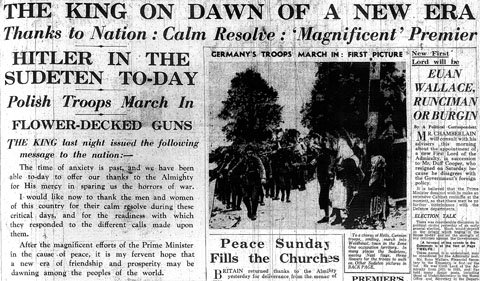
So, after all those weeks of mounting tension over the fate of the Sudetens, it’s finally being resolved: German troops have begun occupying the Sudetenland (Daily Mail, p. 13). Polish troops have also moved into Teschen, and the Czech government has agreed to let a mixed commission decide the fate of the territory claimed by Hungary. The dismemberment of Czechoslovakia has begun.
But at least it’s being done peacefully. The British are still celebrating their escape from war, in their different ways. The King has thanked his people for their steadfastness and his prime minister for his peacemaking. The churches were packed with thanksgivers yesterday, ‘Peace Sunday’. A headline in the Daily Mail (p. 3) promises ‘Fairer Days, Fatter Purses, Full Speed Ahead!‘ and claims that ‘with the crisis over and peace in our thoughts it will be the biggest and brightest October ever known’. A man was arrested in Croydon on Saturday night for driving under the influence (Manchester Guardian, p. 2). He and his passenger had been to a dance to celebrate the end of the crisis, and the passenger’s excuse was that ‘I was glad that I had not been called up’. The judge was not impressed and fined him 10s. for being ‘drunk and incapable’.
Chamberlain is still ‘The Man of the Hour’ (the name of a Pathé newsreel brought out about his life as well as his handling of the crisis: The Times, p. 10). The new Westminster Hospital has been endowed with £1,000 for a bed, to be named ‘The Neville Chamberlain Bed’, ‘in perpetual remembrance of great efforts made by the Prime Minister in the cause of European peace’ (The Times, p. 9). Lucio, in the Manchester Guardian (p. 6) quotes some of the more fulsome paeans of praise from the press, for example this one from James Douglas in Saturday’s Daily Express:
God has raised up in Neville Chamberlain a deliverer. Are we going to waste him? Are we as great as he is? Are we as noble? Are we as pure in heart? Beware of the old evil that is lurking within us, thirsting to destroy us.
More prosaically, there is speculation (in Manchester Guardian, p. 9) that if the House of Commons is hostile to Chamberlain’s report on Munich today, then he may take the country to a general election to capitalise on his popularity among the people. (An election isn’t due until 1940.) Chamberlain has already lost one minister over Munich, Duff Cooper, the First Lord of the Admiralty. His resignation speech, if fiery enough, could spark a revolt among those backbenchers who think too high a price has been paid for peace. Certainly Labour will be critical: one prominent Labour MP, Harold Nicolson, spoke in Manchester on Saturday and said (Manchester Guardian, p. 11):
We have betrayed a valiant little country and a great democratic idea. There are many people who feel that in so doing we have achieved peace for a generation. They are wholly mistaken. We have not achieved peace for a generation: we have achieved it only for eight months.
And the ‘Peace Pact’ which Chamberlain signed with Hitler was ‘not worth the paper it is written on’.
The preparations for war are winding down. There’s much less ARP news in the papers today, and much of what there is is of a minor nature (such as a warning not to test gas masks in gas ovens! Manchester Guardian, p. 10). Sydney King-Farlow, in a letter to the editor of The Times (p. 14), describes the disaster which has been averted:
Had war come upon us, and it was hanging on a hair, it would have begun with repeated attacks by fleets of aircraft which speedily would have converted the capital cities of Europe into heaps of smoking rubble. The noblest works of man which belong not only to particular countries but to the whole world would have disappeared for ever and the destruction of human life would have been appalling.
He asks if this is not an opportune moment to try to reach an international agreement to prohibit the bombing of architectural and historical treasures in the great cities? (King-Farlow was a former chief justice in places like Gibraltar and Cyprus, so perhaps it’s not surprising that he turned to the law.) Cosmo Lang, the Archbishop of Canterbury, expressed similar sentiments in his BBC broadcast last night, but was rather more ambitious (Daily Mail, p. 13):
Surely it is required of nations who have seen the horrors of modern warfare staring them in the face that they should, as a sign of recovered sanity, determine that once for all the use of bombing aircraft shall cease.
The leading article in The Times (p. 13) looks forward to:
an era when the race in armaments will be seen for the madness that it is and will be abandoned because it has ceased even to be profitable.
Whereas the Daily Mail (p. 12) calls for the government to fill the gaps in Britain’s defences, noting particularly that:
The Air Force, both by the production of machines and the training of personnel, must be made, at top speed, second to none.
Members of the Royal Observer Corps have been released back into civilian life, albeit subject to a recall at only two hours’ notice (Manchester Guardian, p. 13). The Air Ministry has been swamped with offers of service of various kinds and regrets that it may take some time to respond to them all. And the Admiralty has announced that those reservists who have been called up but have not yet actually taken up a post can stay at home or return there.

The London Brick Company is clearly proud of the part it played in the crisis.
![]() This work is licensed under a Creative Commons Attribution-NonCommercial-NoDerivatives 4.0 International License.
Permissions beyond the scope of this license may be available at http://airminded.org/copyright/.
This work is licensed under a Creative Commons Attribution-NonCommercial-NoDerivatives 4.0 International License.
Permissions beyond the scope of this license may be available at http://airminded.org/copyright/.


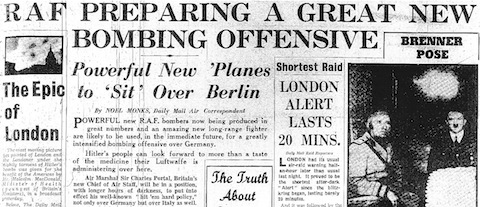
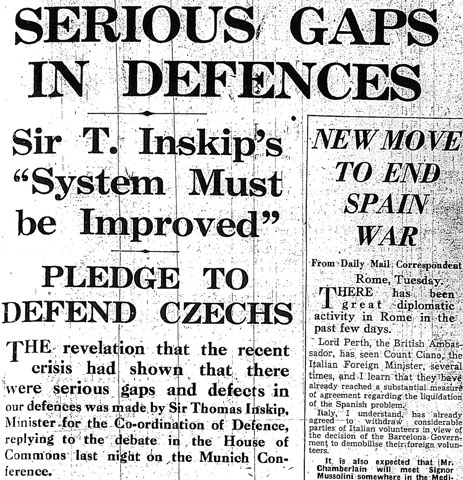
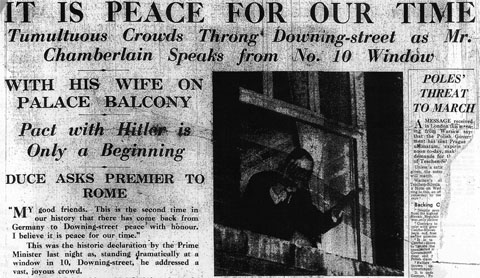
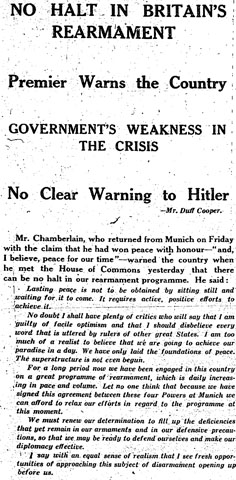
Nicolson wasn’t too far off there.
He’d have looked a great deal more prophetic if he’d callled war for the next campaigning season.
Quite true, Stevis. But they were critical months all the same.
Don’t wish to get into pointless circular debate about the merits of relative force size, but that time allowed the RAF and aircraft production facilities to get their acts together.
The more I look at it, the more I think appeasement has gotten an unjustifiably bad rap.
Pingback: Airminded · Wednesday, 5 October 1938
Yes, the time was put to good use, in a number of areas (and as far as air defence and ARP were concerned, they got another extra year on top of that). But Germany wasn’t resting on its laurels either …